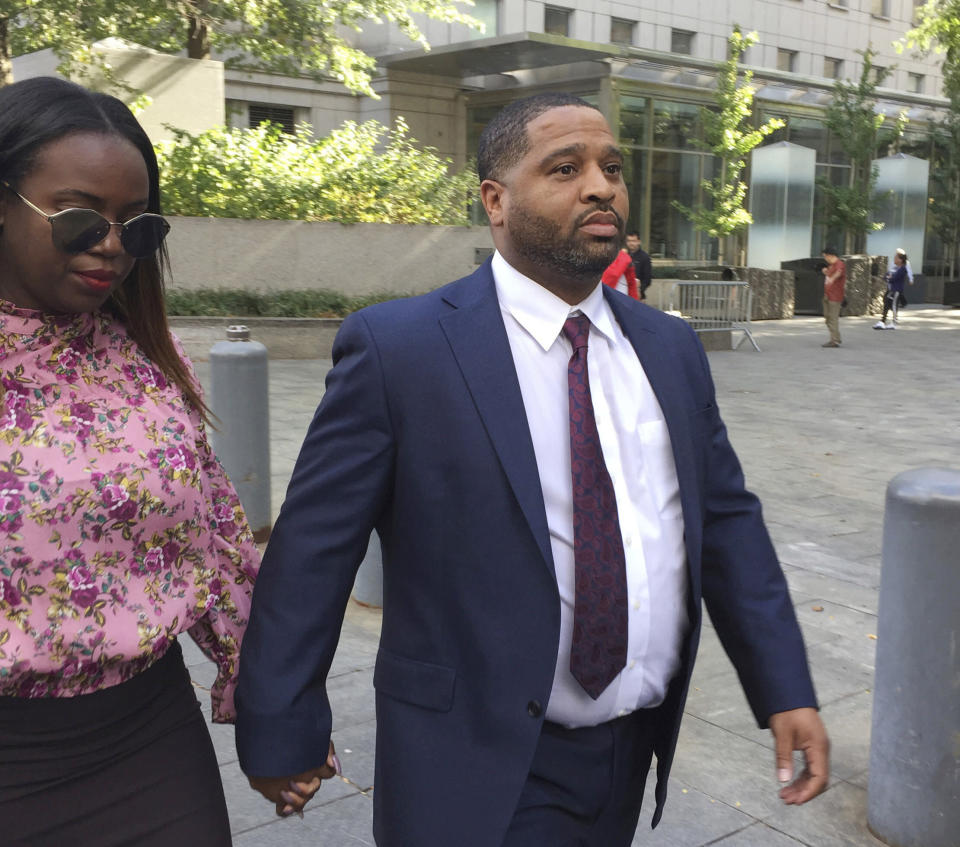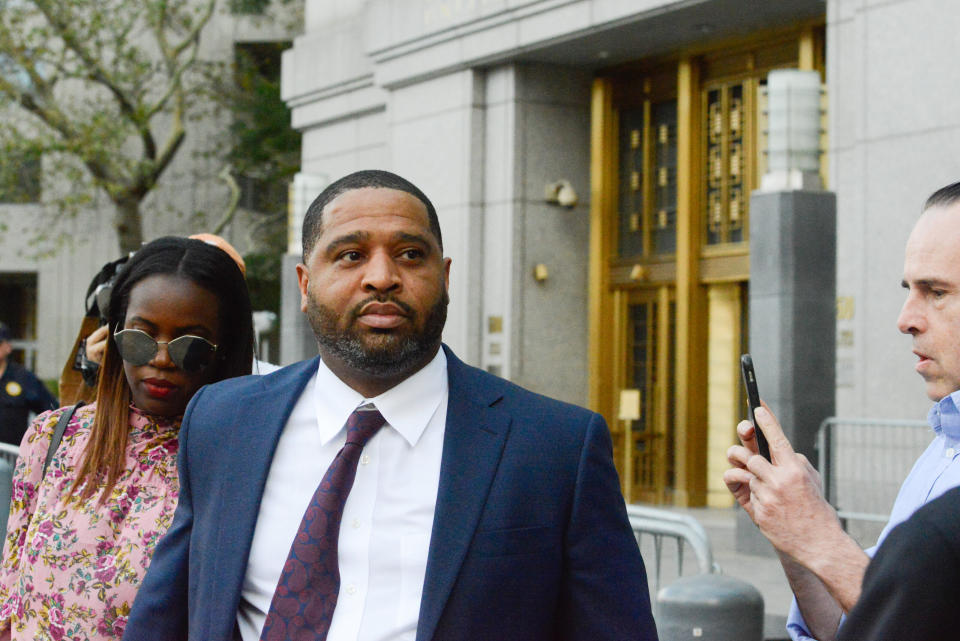Did a $250K-a-year assistant hoops coach go broke paying recruits?

NEW YORK — In 2017, Emanuel “Book” Richardson was having a conversation with his friend, Christian Dawkins, where Dawkins basically called Richardson an idiot.
Richardson was making nearly $250,000 a year as an assistant coach for the University of Arizona basketball team, yet he was still essentially broke. As Dawkins, a budding basketball middleman, noted, it wasn’t because Richardson partied or was having an affair or even bought expensive clothes. He was, per Dawkins, an “off-the-rack guy.”
“I was offended by that,” Richardson said jokingly of the fashion put down. The quote came from an FBI-recorded conversation that was played Monday during the federal basketball bribery trial of Dawkins and co-defendant Merl Code.
On the recording, Richardson, the married father of three, agreed the problem wasn’t what he was spending on himself, it was what he was spending on recruits, families and handlers so they would sign with Arizona. Now, that was expensive.
Then, Dawkins noted, Richardson didn’t even cash in when the player turned professional and signed with sports agents and financial planners, who are more than willing to either pay Richardson for his access to players, or cover his upfront recruiting costs.
“I wish I was a pimp and you were a prostitute, you’d make a million for me,” Dawkins said, per Richardson.
Richardson acknowledged he’d been stupid. He explained he thought using his own money was the best way to keep things tight and, if any allegations arose, “It’s their word against mine.”
Now, though, he was interested in sharing the burden. He said he'd even tapped into retirement accounts for recruiting costs. That’s how he arrived at a meeting with Dawkins' startup sports management company, which unbeknownst to Dawkins and Richardson was being partially funded by undercover FBI agents.
“He was using his personal money to fund his recruiting,” Munish Sood, a financial advisor who was one of Dawkins’ partners, testified on Monday. “Christian suggested using someone else’s rather than his own money.”
Richardson would agree to do that, at least partially. For example, Richardson said on a recording that the Sood/Dawkins group, called LOYD Management, gave him $15,000 to allegedly be paid in three installments to the family of recruit Jahvon Quinerly. But Richardson wanted LOYD to know that he still had his “own skin in the game” too because he felt it was better business.
“Just so you know, I put $10,000 in of my own money to give to the kid’s mom,” Richardson said at the meeting. He also noted he promised to get Quinerly’s mother a job “to put you in a situation to move to Tucson.”
Whether Richardson actually did that, or was just talking big in an effort to inflate his own value to the partnership, is undetermined. It is also unknown if any money actually was paid out to Quinerly or his family. Quinerly, a McDonald’s All-American from New Jersey in 2018, originally committed to Arizona but backed out after Richardson was arrested as the scandal broke (he pleaded guilty to one felony count of conspiracy to commit bribery and is awaiting sentencing).
Certainly there is hyperbole to the conversations. Richardson wasn’t bankrupt, for instance. However, as good as his salary was, it didn’t offer a bottomless well of money to sprinkle around. He was basically a small business. There were bills to be paid.
Even by the absurd standards of college athletics, the concept of a top-level assistant coach claiming financial woes because landing recruits is such an expensive proposition was a rather astounding moment. That it occurred in the middle of a federal trial made it even more surreal.
It’s why this case shouldn’t be about how the NCAA can use certain information to bust certain schools or players.
Rather, the broad picture painted here of an NCAA rulebook that is outdated, blatantly ignored and the cause of so many problems, should forever bust the NCAA’s concept of amateurism and usher in a new system.

Richardson's story should humiliate everyone in college athletics. To have a job with a national power such as Arizona, Richardson needed to land top recruits. Yet to land top recruits, and keep them happy while on campus, Richardson needed money. And so it seems like everything was a scheme.
Richardson said he preferred payments to come in installments rather than a lump sum to both keep recruits/middlemen on the line and avoid scrutiny that tens of thousands of dollars would bring.
“Where do you put it?” Richardson said. “Because you can’t put [it] under your mattress. Now you’re dealing with the alphabet boys, not the NCAA, the DEA, the CIA.”
He didn’t know that it was a different bunch of letters, the FBI, that was recording him at the time.
Another trick Richardson said he employed was to set up a deal with a player/family/handler during their official campus visit, but then make the recruit take a couple visits to other schools before publicly announcing his commitment to Arizona weeks later.
“I don’t want the NCAA kind of [expletive] with us,” Richardson said on one tape. “You never want someone to worry you went to Arizona and you committed on campus. [They’ll say] ‘What happened?’ ”
Richardson said he would use a check that came each summer for working the University of Arizona basketball camps for some payouts, but that couldn’t cover everything.
Recruiting at the highest level is a beast … and nothing apparently comes for free.
For instance, on tape, Richardson said he paid a cousin of Rawle Alkins, a UA player from New York, “two grand a month” after the cousin moved to Tucson to be near Alkins. After two seasons with the Wildcats, Alkins turned pro and spent this season playing mostly for the Chicago Bulls’ G-League team.
If that is true, then it’s $24,000 a year, or 10 percent of his pre-tax salary. That would be just one outlay. He was in charge of recruiting more players than that. And they didn’t land them all.
Richardson was certainly someone who was believed to be capable of getting players. On one tape he claimed that LSU head coach Will Wade tried to hire him away from Arizona in part for Richardson’s ties to Naz Reid, a top 2018 recruit from New Jersey.
“[Wade said], ‘Look, there’s a deal in place, I’ve got $300,000 for him,” Dawkins said on the tape, before intimating that Wade was overpaying for Reid. “I said, ‘Give me half and I’ll make sure the kid goes there.’ ”
Recruiting against schools in the SEC was particularly challenging for Richardson. “[Richardson] was recruiting [Reid],” Sood testified, “but LSU seemed to be more willing to pay him to attend LSU.” Richardson said he once won the battle for one Louisiana native even though Richardson said that he later found out Lil Wayne was somehow involved. Or that, “When I’m recruiting against Mississippi State, all bets are off.”
Again, whether Richardson’s stories are truthful or boastful is unknown. They didn’t occur under oath. When speaking, he was trying to impress his various audiences.
What is clear is that the current model for basketball players is broken in every imaginable way. It’s relatively easy to identify future NBA players, but due to draft rules and college (and even high school) amateurism statutes, those kids are lottery tickets waiting to be cashed and thus surrounded by would-be agents, financial planners and others.
In the middle is college basketball, a lucrative industry that prohibits compensation for its players and families ... at least above the table.
With everything hidden, the system attracts those willing to engage in unusual, or indeed even illegal, business practices. It’s a complete mess that doesn’t serve the players, the game or much of anything except the coaches and administrators who are profiting off it.
The system creates the exploitation, though. The recruits get paid under the table, but later they get used by those same coaches who steer them to agents and financial planners regardless of whether they would do a good job for the player. Money, the need for it, the making of it, fuels everything.
So whatever coaches get paid by agents usually just goes back into recruiting.
“They're not going to use those monies, not necessarily, to put in their pocket,” Adidas consultant Merl Code said on one tape about assistant coaches. “They’re going to use those monies to recruit kids."
That, apparently, is how you either nearly go broke on a quarter-million-dollar salary or make a deal with an agent.
And it’s why it sure would be a lot easier, not to mention legal and ethical, if the NCAA finally ditched the charade of amateurism once and for all.
More from Yahoo Sports:

